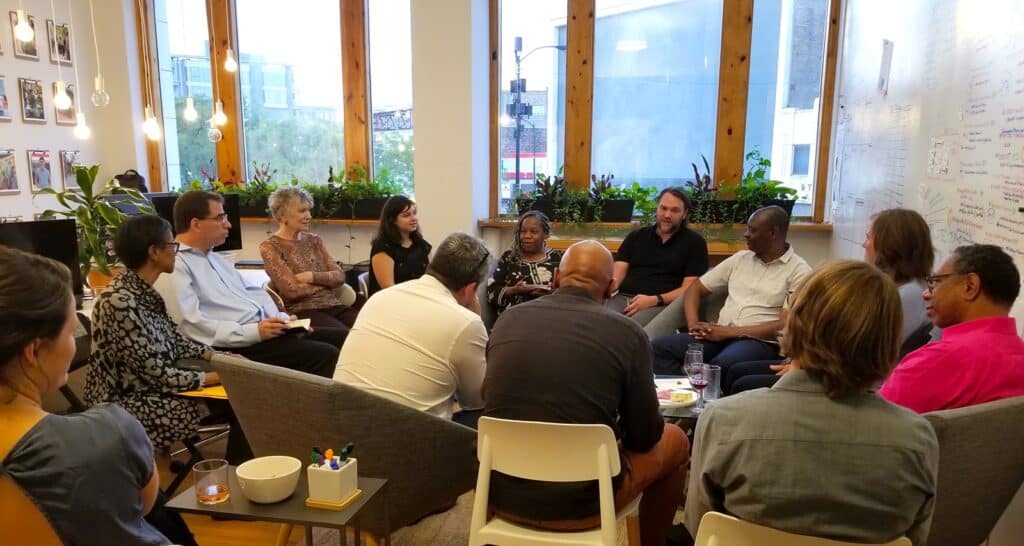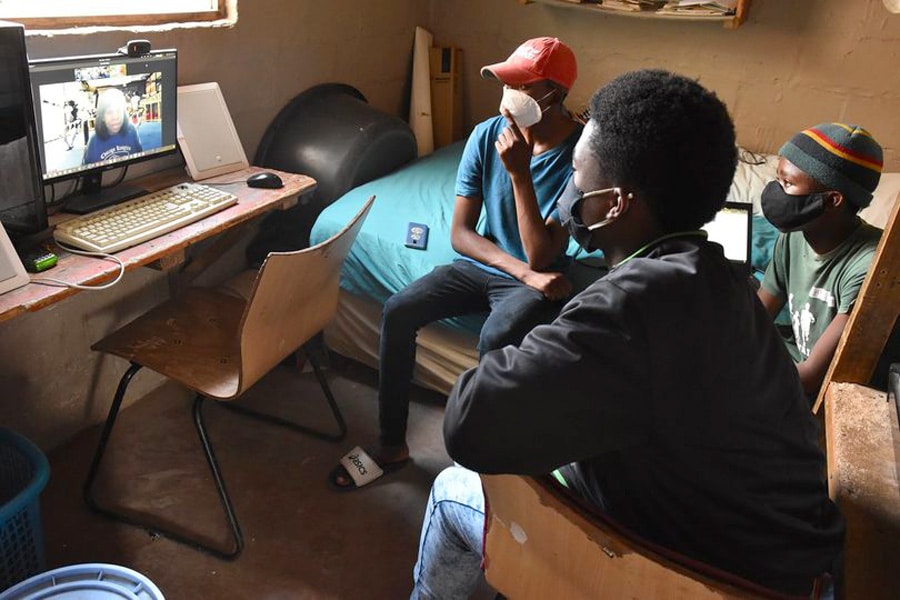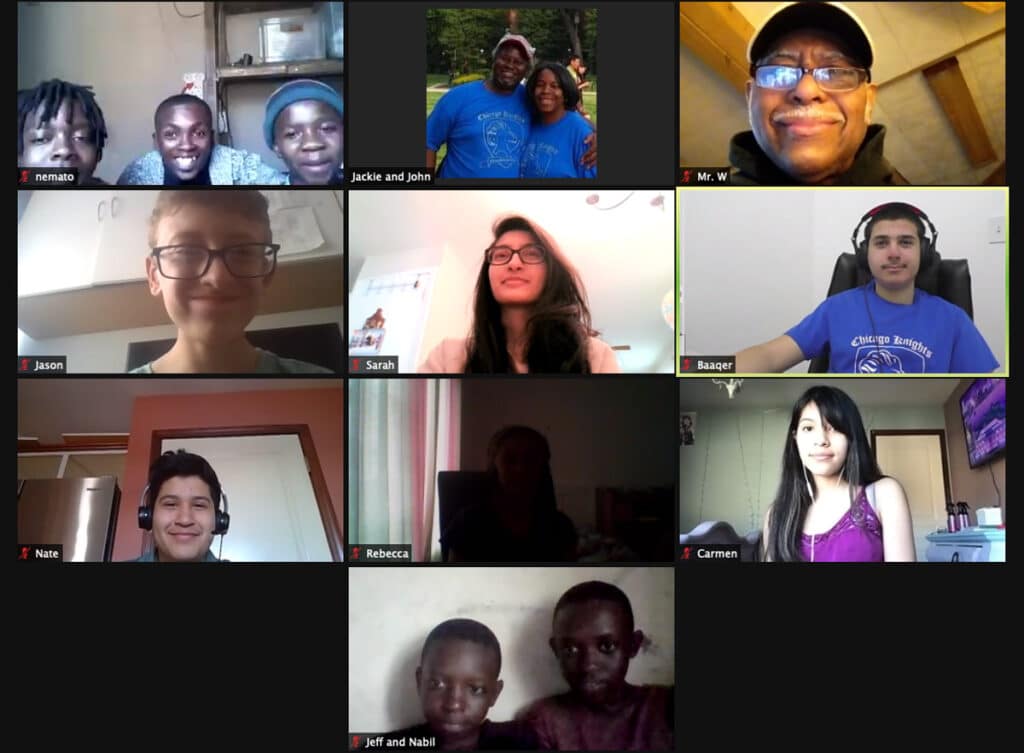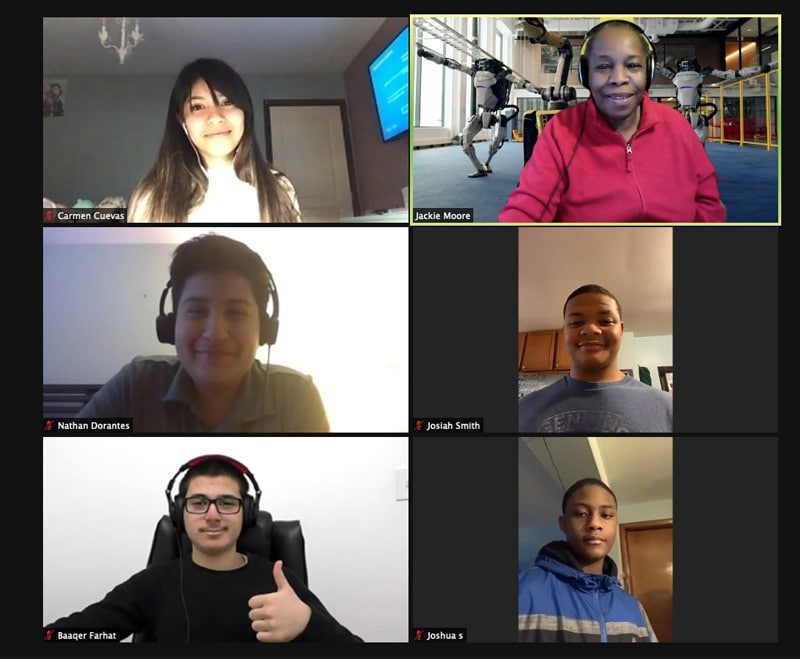United by STEM: One Team, Two Continents
featuring Dieudonne Allo and Jacquelyn Moore

Two Goldin Fellows from South Africa and the USA (Dieudonne Allo and Jacquelyn Moore) are joining forces to convene young people with an interest in STEM and Robotics from Chicago (USA) and Port Alfred (South Africa) to collaborate as a unified team to compete in the FIRST® Innovation Challenge presented by Qualcomm.
Both seasoned professionals in teaching STEM through real world application in their respective countries, Dieudonne and Jacquelyn share a commitment to teaching robotics related skills to illustrate the value of engaging in a cross-continental collaboration with youth ages 13-19. For Inspiration and Recognition of Science and Technology (FIRST®) is a global community which seeks to empower and equip young people to become innovators in STEM, and foster life-long skills through inclusive team-based initiatives.

Allo is the CEO of the Global Leading Light Initiative, a non-profit in South Africa which supports young people in historically disadvantaged communities to acquire future proof skills, with the aim of reducing poverty and inequalities. Moore is the founder and Executive Director of Agape Werks, Inc, a community based non-profit in Chicago with a mission to promote in young people an appreciation of math, science, technology, and engineering as strategic tools for success regardless of life circumstances. In Agape Werks’ offerings, all skills will be learned and applied in an inclusive and collaborative environment that partners teens of various skill levels, interests, and heritage with caring and professional adults, all focused on the same goal.
Allo and Moore developed the “One Team Two Continents” concept in 2019 when they began exploring cross-continental collaboration opportunities after meeting through the Goldin Global Fellows program. This initiative envisions a youth-led, distributed team working together by using robotics related skills to meaningfully address common issues that impact their geographically dispersed communities.
The global pandemic led to FIRST® making their programs virtual, removing the need for participants to travel. One of these remote programs offered by FIRST® was the Global Innovation Challenge, a competition for teams to design a solution under the theme of ‘active play and movement’, for which youth from South Africa formally joined the Chicago Knights to compete in the 2020-21 FIRST® GAME CHANGERS℠ powered by Star Wars: Force for Change. In February of 2021, the youth began working together to submit a solution to the challenge:
“Identify a problem or opportunity to help people (or a community of people) keep, regain, or achieve optimum physical and/or mental health and fitness through active play or movement”.

The team represents 2 continents, 3 countries, 8 unique primary languages, plus 5 unique languages team members are learning.
Each member has committed to meeting three days a week for at least 10 weeks, to learn from each other and to foster cross-cultural collaboration and sharing. Bringing together their combined knowledge, passions, insights, and interests, they have developed a solution based on cutting edge technology and empathy for their users. They are now focused on finalizing their business presentation and pitch. The team (the International Chicago Knights) will be pitching their solution to a panel of judges on April 3, 2021 and will share it with you here, soon after.
When asked why they joined the team, the youth responses ranged from “my mom wanted me to join, but now I really enjoy learning programming” (Rebecca, South Africa) to “I am interested in learning about and designing a robot” (Anathi, South Africa). Almost all of them are excited about learning to use the Python programming language. Team member Baaqer (USA) adds: “passion to discover new technologies and solve challenging problems in the purpose of helping people gives me the everyday encouragement to stay effectively committed to the challenge.”
Moore has led the mentoring and learning process during the 5 different sessions each week, with a diverse group of mentors and subject matter experts working with her. This includes team alumni, retired engineers, medical professionals, and business partners. Programming mentor, Sarah (graduate student, USA) volunteers because her “desire for constant learning is a significant motivation to be involved in this challenge. I want to learn, help, and work with others to solve problems!” The team members are learning a variety of business, technical, and interpersonal skills, and how to apply these skills to group problem solving. More importantly, the teens are learning new ways of communicating and gaining a deep understanding of creating universally accessible products.
“This extraordinary learning experience is not only imparting STEM-related skills, but it is also changing teens’ perceptions of themselves, others and life. At GLLI, one of the main challenges we have faced in our work with young people is their limited beliefs about themselves and others. ‘One Team Two continents’ is going beyond teaching them robotics and design skills to tackle this challenge in a significant way. The co-creation and excitement which I observe during sessions constantly raise the question, “How can we help more underserved teens to access this program?” —Goldin Global Fellow, Dieudonne Allo, South Africa.

“This particular initiative is a concrete example of what we want to accomplish as partners. It’s an opportunity to test and prove that it can work. We are not chasing the trophy in this competition; we are chasing the goals, but if we get the trophy that’s icing on the cake.” — Chicago Peace Fellow, Jacquelyn Moore, USA.
To ensure the success of this initiative, the One Team Two Continents team needs your support.
Their process requires resources which most youth cannot afford and cannot access. The One Team Two Continents initiative would appreciate any help to obtain the following items. To make a contribution please visit the team’s PayPal page.
To support remote learning:
- Mobile hotspots (or home internet access)
- Internet capable computing devices (at least a smart phone or tablet)
- Webcams
- Microphones
- Headphones
Additionally, to support learning specific skills:
- Windows 10 computers with at least 8G RAM (for robotics specific software, also supports remote learning)
- three button USB mice (for 3D modeling and design)
- Electronics Project Kits
- Educational robot kits
To support bringing the product to market, cash, or in-kind donations of:
- Raw materials for fabrication (polycarbonate, acrylic, 3D filament)
- Graphics Artist (marketing purposes)
- Specific electronic components (sensors, micro controller, etc)
To Support travel when it is permissible, cash donations help pay for:
- Passport and Visa fees for students
- Travel Costs (local and abroad)
- Housing for students and mentors/chaperons
- Cultural experiences (local and abroad)
Principles and Practices that Empower Shared Learning

On Wednesday, April 3, the Chicago Peace Fellows came together to build a list of principles and practices that will unlock shared learning and collaborationfor the group. This workshop was hosted by Peace Fellow Alex Levesque at his Automotive Mentor Group, where he trains young men and women to remodel classic cars. His program recruits youth at high risk of being involved with violence.

Alex started the workshop with a tour of the facilities and details of his program, sharing how he helps young people find purpose through their work with cars. He told us about his triumphs in helping young people find gainful employment and some of his challenges with reaching young people and the barriers they face around employment, homelessness and violence in the community and at home.

We started our conversation about the differences between best practices and best principles with Alex’s locker full of belts. He has a locker full of belts because it is a requirement that everyone has a belt on when working on the shop floor. He noted that many young people do not wear belts and that it would be a challenge to have to turn away a participant simply because they didn’t have the appropriate attire. Many of his participants come from different parts of town and have long and complex commutes. His best principle is safety first and a best practice that he developed was to have belts at the shop for anyone that needed one.

After this conversation, we moved into a workshop where we sat in different groups and discussed what our best principles can be as a group. The group reflected on the course curriculum and reviewed the dozens of comments on the theme on the discussion board.
After a process of grouping comments into themes and prioritizing values that we can share and enact, the group refined the list to the following five core principles:
- Communicate openly, inclusively, honestly and respectfully.
- Promote compassion, harmony and peace.
- Embrace mutual support and accountability.
- Adopt an intergenerational and intersectional worldview.
- Foster a growth mindset.

The group will continue to grapple with these principles but they committed to adhering to these as a group in how they engage with each other, the curriculum and the communities in which we work. Often, what is shared between practitioners are best practices but we focus on best principles because the practices should fit the context, and principles encourage others to develop practices based on what’s best for them.

